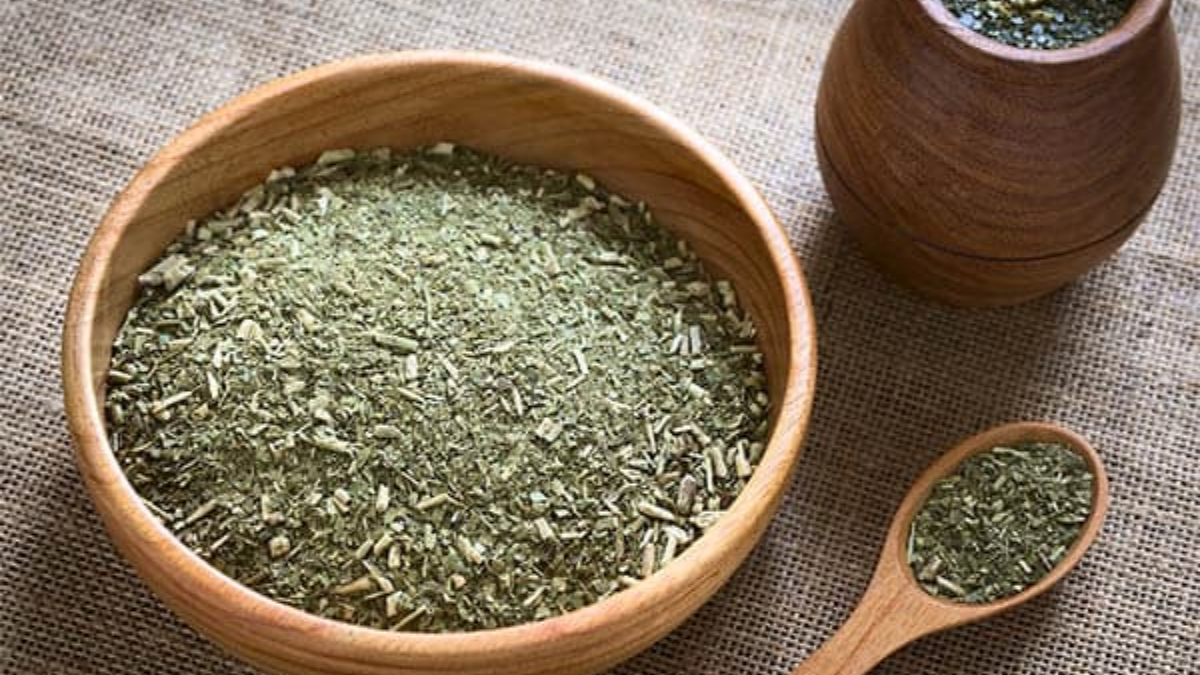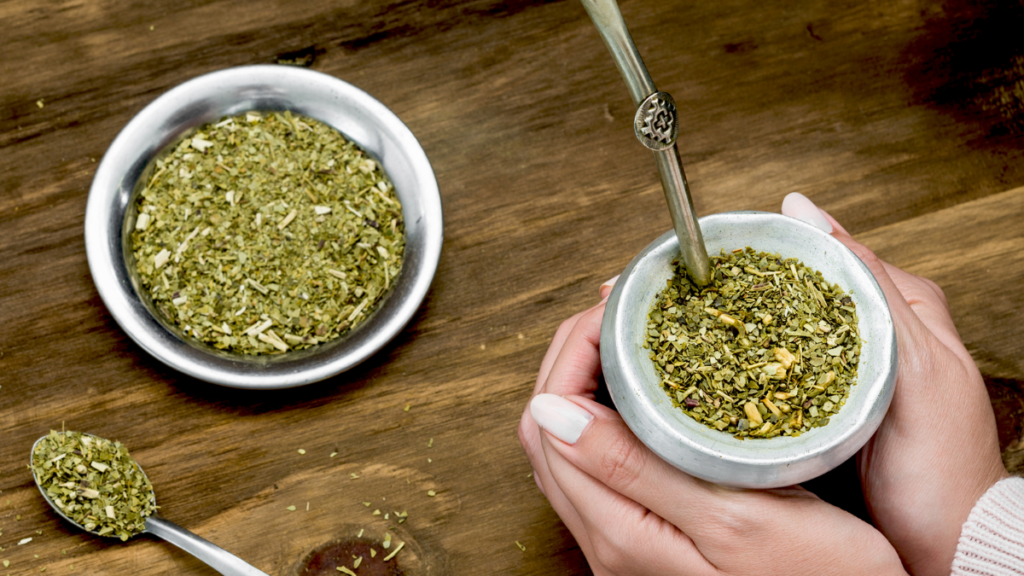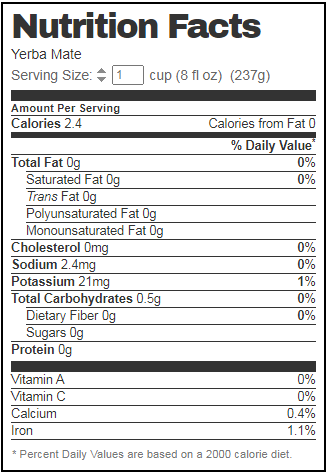Caffeinated Yerba mate is a herb made from holly plants grown in South America that is commonly consumed in herbal teas or as dietary supplements such as energy drinks. This herb may provide various health benefits and help you feel more energized. To know about yerba mate nutrition facts, read further.
Yerba mate products, especially herbal teas, are generally low in calories. However, when drinking Yerba mate energy shots or drinks, exercise caution because they are frequently marketed as dietary supplements, which are not strictly regulated by the US Food and Drug Administration and often contain added sugar.
The majority of the calories in this yerba mate beverage come from carbohydrates. According to the USDA, a yerba mate beverage contains no fiber, so carbs are derived from sugars or starch. It’s important to remember that not all yerba mate drinks are created equal. Added sugars or other ingredients in some yerba mate beverages alter the nutritional profile. Sugars that are added during processing are known as added sugars. They are regarded as less healthy than naturally occurring sugars found in fruits and dairy products (such as fructose or lactose).
Yerba Mate Nutrition Facts
What is Yerba Mate?
Yerba mate is a South American plant species belonging to the holly genus Ilex. Augustin Saint-Hilaire, a French botanist, gave it its name. Mate is a beverage made from the plant’s leaves steeped in hot water. It’s used to make tereré when brewed cold.
Caffeine is present in both the plant and the beverage. Before European colonization of the Americas, indigenous Guaran and Tup communities (whose territory included present-day Paraguay) cultivated and consumed yerba mate.
It was only consumed by residents of two regions of what is now Paraguay, namely the departments of Amambay and Alto Paraná. Yerba mate became popular throughout the province and even throughout the Spanish Crown after the Jesuits discovered its commercial potential.
Varieties
The most common way to consume yerba mate is as an ingredient in commercial beverages. Some people, however, wonder if yerba mate can be purchased in bulk.
You can buy loose-leaf yerba mate in bulk for tea, but there are only a few vendors. You may also be required to purchase large quantities that are not suitable for home use.
Yerba mate leaves are typically air-dried, but commercial producers are experimenting with other methods to impart flavor. The flavor profile of wood-dried yerba mate, for example, is known to be rich and full-bodied.
What are the Health Benefits of Yerba Mate?
Yerba mate is said to have several health benefits. Not all of the advantages are backed up by solid scientific evidence, and the risks may outweigh the benefits in some cases.
Increased Energy and Focus
Caffeine is naturally present in yerba mates. Caffeine is a widely used stimulant. The central nervous system, the heart, and the skeletal muscles are all stimulated. It may also aid in the improvement of focus, at least in well-trained individuals (those who are already able to do moderately intense bouts of physical activity).
Improved Exercise Efficiency
According to the same researchers who focused on exercise, women who consumed yerba mate were able to burn more fat during the exercise study. According to their published study, they found that combining yerba mate intake with steady-state, prolonged exercise at targeted fat-loss intensities improved fatty acid oxidation during the workout. It also improved satiety and mood, according to the researchers.
Weight Loss
There is some evidence that yerba mate can help people lose weight. For 12 weeks, participants in one study were given either 3 grams of yerba mate capsules or a placebo. Researchers discovered that those who consumed yerba mate had lower body fat mass and body fat percent, and those who consumed yerba mate had a lower waist-to-hip ratio. Study participants reported no significant side effects.
Caffeine in yerba mate also acts as a diuretic and increases gastric and colonic activity. This may aid those who consume yerba mate to lose weight quickly but only through losing water weight.
Better Heart Health
According to some evidence, supplementation with yerba mate may have a protective effect on the cardiovascular system. A post hoc analysis of 99 postmenopausal women was included in a 2018 study published in the Brazilian Journal of Medical and Biological Research. Women completed a questionnaire to assess the relationship between yerba mate consumption and the prevalence of hypertension, dyslipidemia, and coronary disease. The researchers discovered that consuming more than 1 liter of mate infusion per day was linked to fewer self-reported cardiovascular diseases and lower glucose levels in the blood.
Other Possible Benefits
Yerba mate is sometimes used to treat:
- Chronic fatigue syndrome
- Constipation
- Depression
- Headaches
- Kidney and bladder stones
- Low blood pressure
- Urinary tract infections
Safety and Side Effects
Yerba mate is unlikely to cause harm to healthy adults who drink it occasionally. However, those who drink it regularly may be at increased risk of the following:
- According to research, drinking a lot of yerba mate for a long time has been linked to an increased risk of upper respiratory and digestive tract cancers.
- Caffeine is present in yerba mate. Caffeine overdose can result in headaches, migraines, and high blood pressure. Pregnant women should drink no more than three cups of meat per day. Caffeine consumption during pregnancy may increase the risk of miscarriage and low birth weight.
- Certain compounds in yerba mate have been shown to have monoamine oxidase inhibitor (MAOI) activity in studies. MAOIs are frequently prescribed as antidepressants and Parkinson’s disease treatments.
- Mate contains polycyclic aromatic hydrocarbons (PAHs), known carcinogens in tobacco smoke and grilled meat, which could be one explanation.
When it’s Best?
The evergreen tree (or bush) yerba mate grows in South America. The tree blooms between October and December, and however, the tea is available all year.
From January to April, yerba mate seeds are harvested. Between March and May, new yerba mate plants are planted. Although some people grow their yerba mate, it is most commonly found in pre-packaged teas.
Can you Smoke Yerba Mate?
Though it hasn’t been studied extensively, drinking tea rather than smoking it is preferable. Smoking might not give you what you expect from the rest of the herbs because the phytochemicals do not have pronounced neuro-stimulatory effects on your body. On the other hand, yerba mate tea, which contains a lot of caffeine and provides clean energy and euphoria, can help you quit smoking.
Storage and Food Safety
Yerba mate tea leaves should be stored in the same manner as any other tea leaves. Experts recommend avoiding heat, moisture, light, air, and odor. As a result, dry tea leaves should be stored in an airtight container in a cool, dark location away from spices and other odors. If possible, use an opaque jar or packaging.
After about six months, tea begins to lose its flavor. Within a year, you should consume dried tea. Although loose-leaf tea can be frozen, it is not recommended.
How to Prepare?
Prepare yerba mate tea as you would prepare most traditional teas.
- Place a tea infuser containing about one tablespoon of loose tea leaves in a teacup.
- Heat water to 90-95 C or 194-205 F. If you don’t have a temperature-controlled teapot, bring water to a boil and sit for a minute to reduce the temperature just slightly.
- Pour eight ounces of water over the infuser.
- Let tea leaves steep for as long as desired.
- Remove the infuser.
Conclusion
Yerba mate tea contains a variety of nutrients that aid in overall health. Polyphenols, xanthines, caffeoyl derivatives, and saponins are abundant. Zinc, chromium, potassium, copper, aluminum, iron, manganese, and nickel are among the minerals found there. Vitamin C, vitamin B1, and vitamin B2 are among the vitamins found. Yerba mate isn’t for everyone, and drinking it frequently at high temperatures can raise your risk of certain cancers. On the other hand, this beverage contains several beneficial compounds that have been linked to a variety of health benefits. If you want to give yerba mate a try, start with a small amount and let it cool before drinking.



